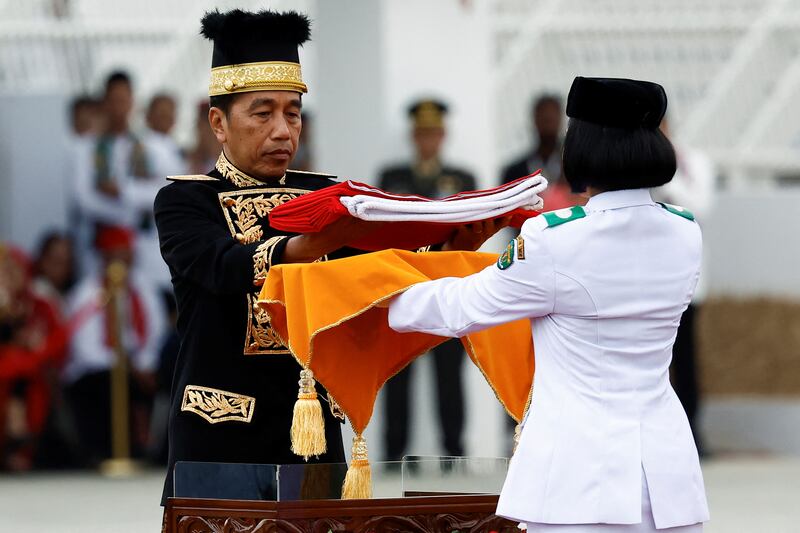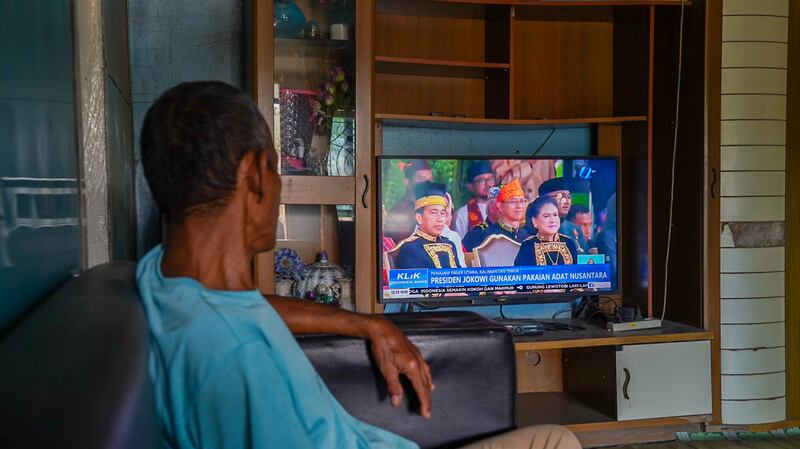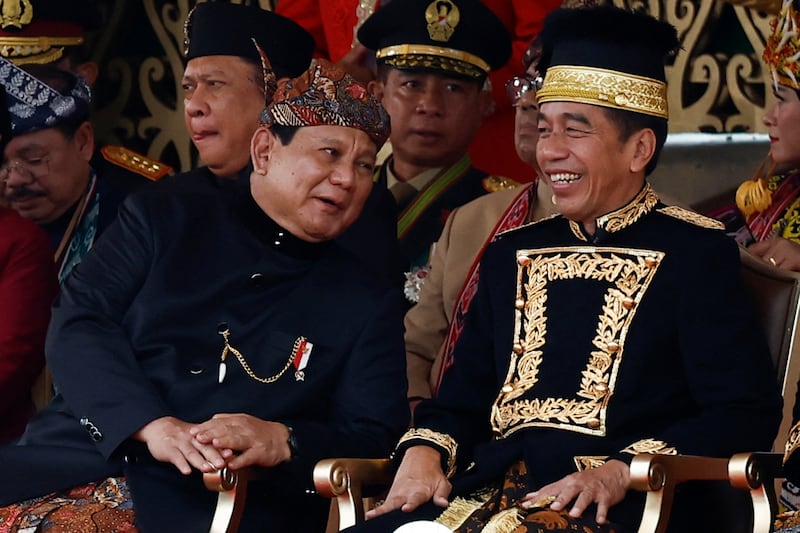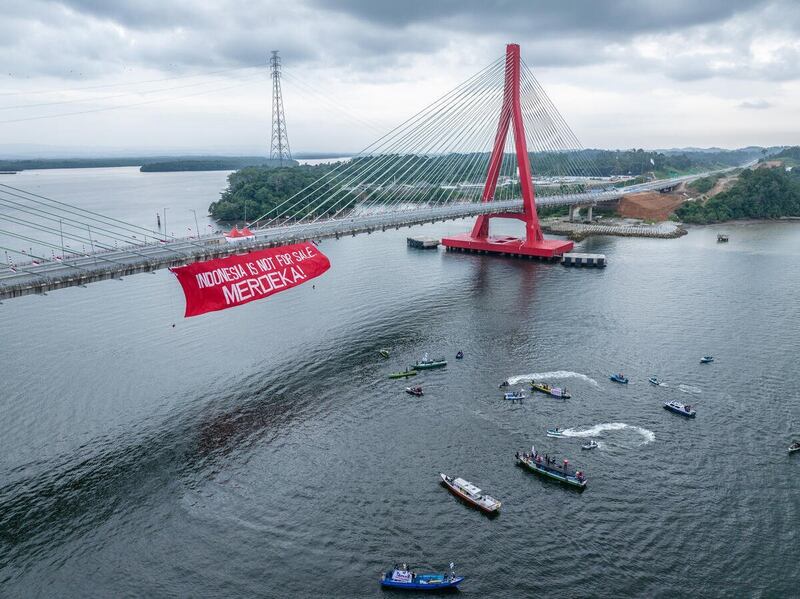Outgoing Indonesian President Joko “Jokowi” Widodo oversaw the nation’s first Independence Day ceremony in its future capital on Saturday, against a backdrop of cranes and unfinished structures.
The event in Nusantara, located on the island of Borneo, was attended by construction workers, hand-picked local residents, and key figures including President-elect Prabowo Subianto, parliament speaker Puan Maharani, and other top officials.
Independence Day activities in Nusantara began with a midnight ceremony led by Jokowi at the city’s newly finished memorial park.
It was followed by a flag-raising ceremony, a nationally televised event that featured a flyover involving nine F-16 Fighting Falcon jets of the Indonesian Air Force.

Amidst the roar of the jets, some residents expressed disappointment at being unable to witness the ceremony up close.
“We live here, after all,” Raniah, a 62-year-old shopkeeper living in a nearby village, told BenarNews. “Can’t they just check our ID cards and let us see the site?”
Raniah said poor network connectivity prevented her from watching the livestream of the ceremony on YouTube, forcing her to serve customers instead. She planned to watch a recorded broadcast later that evening.
Meanwhile, others like Ahmad Ali, who travelled from East Java, waited outside the ceremony grounds, hoping for a chance to participate, but was directed away from the site with a promise of transportation that never arrived.
“I’m a bit disappointed,” Ali told BenarNews.

The new city is still under construction, with only a few government buildings nearing completion. Much of the essential infrastructure, including housing, educational institutions, and healthcare facilities, remains unfinished.
A shortage of accommodations forced the government to cut the number of guests attending the event to 1,300 from 8,000 announced earlier.
Agus Harimurti Yudhoyono, the chairman of the Democratic Party and son of former president Susilo Bambang Yudhoyono, said he was “proud” of attending the first-ever Independence Day ceremony at the new capital.
“This marks a historic moment for us all—a symbol of our nation’s progress,” said Agus, dressed in traditional attire from Central Kalimantan.
Meanwhile in Jakarta, Vice-President Ma'ruf Amin, joined by Vice President-elect Gibran Rakabuming Raka, led a parallel celebration at Merdeka Palace.

Jokowi began working in the new presidential palace in Nusantara late July. He held his first cabinet meeting there on Monday, calling it a “special” moment while acknowledging the city's construction challenges.
The decision to relocate Indonesia’s capital from Jakarta to Nusantara was announced in 2019 by Jokowi, who cited concerns over Jakarta’s overcrowding, pollution, and vulnerability to natural disasters such as earthquakes and flooding.
Many believe Jokowi considers the U.S. $32 billion project his legacy project as he prepares to exit office in October having served the maximum two terms.
Slated for completion in 2045, Nusantara is planned to accommodate about 1.9 million residents in an area of about 1,000 square miles.
But a lack of foreign investor interest and land acquisition problems have caused delays.
Environmentalists have raised concerns about the impact of the new capital’s development on the surrounding rainforest and its biodiversity.
Additionally, the project’s massive cost has drawn criticism, particularly in light of Indonesia’s other pressing needs, such as poverty reduction and health care.
Jokowi has delayed signing a presidential decree to relocate the capital, hinting that it could be Prabowo’s task.

Jokowi on Wednesday cautioned against rushing the relocation of civil servants to Nusantara.
Last month, the ministry of bureaucratic reform said an initial group of 1,740 civil servants was scheduled to move in September, though the full transition may take longer.
“The plan is still for September, but we don’t want to rush it. If preparations are not complete, we may have to postpone it,” Jokowi said.
The relocation involves the construction of 47 residential towers for civil servants, with 21 already completed, according to the Nusantara capital authority.
A three-phase strategy for relocating civil servants is in place, officials said. The first phase will relocate a select group based on institutional needs and housing readiness, offering pioneer allowances to early movers.
The second phase includes a recruitment drive, with over 40,000 positions earmarked for central government institutions in Nusantara.
The third phase will see local civil servants transferred from surrounding regions to bolster administrative capacities.
Prabowo, who is scheduled to be sworn in as president in October, has promised to continue and accelerate Nusantara's construction.
Jokowi shared Prabowo's enthusiasm, though with a note of caution.
“Prabowo actually wants to speed up the development,” he said on Wednesday.
“I told him that building Nusantara will take 10, 15, 20 years. He responded, ‘That’s not fast enough; I want it done in four, five, six years.’ It’s up to him.”
Near the site of Saturday’s Independence Day ceremony, civil society organizations and locals gathered at a beach to highlight what they see as the detrimental impacts of the new capital’s construction.
Activists from Greenpeace unfurled a large red banner that read “Indonesia is not for sale, Independence!” from a newly constructed bridge.

Fathur Roziqin Fen, executive director of the Indonesian environmental group Walhi in East Kalimantan, said Nusantara’s development threatened local wildlife, including orangutans, proboscis monkeys, and dolphins in the Balikpapan Bay.
“Nusantara is the perfect face of the illusion of grandeur in the celebration of 79 years of independence,” said Fathur. “Our pride in nationalism and nationality is trapped in the grandeur of infrastructure alone. The facts on the ground, such as agrarian conflicts, ecological impacts, and criminalization, are obscured.”
Nusantara’s construction has led to the loss of forest area equivalent to nearly 50,000 football pitches over the past five years, according to Forest Watch Indonesia.
The environmental watchdog said just 77,500 acres of natural forest cover remains in the area designated for the new capital.
Trubus Rahadiansyah, a public policy expert at Trisakti University in Jakarta, criticized the limited involvement of local residents in the Nusantara event.
He said the celebration could have served as an opportunity for the government to connect with those affected by the capital's relocation, many of whom have lost their land to make way for the project.
“There are numerous reports from residents living 3 to 4 kilometers away about water issues and insufficient compensation for their land,” he said. “It’s they who should have been invited, not the diplomats and officials from Jakarta.”
Tria Dianti in Jakarta contributed to this report.
